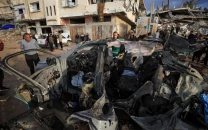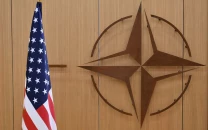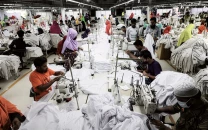Divided EU holds crisis summit after refugee deal forced through
Deal was not passed unanimously, showing sharp divisions in the 28-nation bloc on how to tackle migration crisis

Syrian refugees and migrants walk in a field to cross the border between Greece and FYR of Macedonia on August 29, 2015. PHOTO: AFP
Overriding opposition from eastern European states, interior ministers approved plans Tuesday that require all to take their share of the hundreds of thousands of migrants who have overwhelmed frontline states such as Greece and Italy.
But in a rare step on a matter concerning a core sovereign right, the deal was passed by majority vote instead of unanimously, highlighting sharp and growing divisions in the 28-nation bloc on how to tackle the worst migration crisis since World War II.
Read: Under pressure: EU approves migrant deal amid opposition
Hungary, the Czech Republic, Romania and Slovakia voted against the relocation plan while Finland abstained, arguing that Brussels has no right to make them take people in.
EU Migration and Home Affairs Commissioner Dimitris Avramopoulos rejected any suggestion that the outcome did more harm than good, insisting that all member states were now on board.
"On the contrary, it is a victory for the EU and for all member states," Avramopoulos said Wednesday as he arrived for talks with officials before the 1600 GMT leaders summit.
"We are determined to work closely with all member states... We need to work hard to implement what was agreed yesterday," he said.
In Bratislava, Slovakian Prime Minister Robert Fico said he was prepared to break the EU's rules rather than accept the proposal.
"I would rather go to an infringement than to accept this diktat," he said, quoted by Slovakia's leading SME daily.
"Very soon we will find that the emperor is naked. Common sense has lost today!" Czech Interior Minister Milan Chovanec tweeted after the vote.
Wednesday's summit will focus on the next steps to take, mainly strengthening the bloc's external borders and providing extra funds for Turkey, Jordan, Lebanon and UN agencies.
Any summit decision must be unanimous under EU rules, unlike decisions taken at the level of ministers.
Europe is under increasing pressure over its handling of a huge influx of hundreds of thousand of migrants this year, many of them fleeing conflict and repression in Syria, Afghanistan and Eritrea.
Pictures earlier this month of a drowned Syrian refugee toddler washed up on a Turkish beach sparked global outrage.
In response, European Commission head Jean-Claude Juncker drew up plans for mandatory quotas and a permanent mechanism to manage the refugee influx overseen by Brussels.
The proposals were then pushed by France and Germany, the "power couple" of the European Union, but newer eastern European members balked, especially Hungary, which closed its border with Serbia and introduced draconian laws to punish those crossing into the country illegally.
Read: UN calls for European 'solidarity' in migrant crisis response
Such measures may have slowed but not halted the influx, with refugees saying they have no option but to seek refuge in Europe.
US President Barack Obama pressed European nations on Tuesday to take their "fair share" of refugees.
The statement, which came after a phone call Tuesday with German Chancellor Angela Merkel, is likely to be seen as a warning to those who opposed the deal.
But Obama also faces charges that Washington has not done enough to address the crisis.
With millions of Syrians forced into camps across the Middle East, tens of thousands crossing Europe on foot and hundreds washing up dead on beaches, America has promised to take in only 10,000 as refugees next year -- a figure dwarfed by the up to one million Syrian refugees Germany is expecting to welcome this year alone.
The crisis has raised fears the EU's cherished Schengen passport-free zone could collapse as countries close their borders to stem the flow of migrants, most of whom head for Germany.
Officials said the relocation deal covered 66,000 refugees who would be moved from Greece and Italy to other EU countries, plus another 54,000 who had previously been earmarked to be relocated from Hungary before it refused to back the plan.
It also involves the creation of "hotspots" -- special centres in frontline states for receiving and processing asylum seekers and separating economic migrants from genuine refugees fleeing conflict.
Last week, ministers approved a separate plan dating from May to relocate 40,000 refugees.
Britain, which has exercised its right to opt out of the relocation plan, on Tuesday confirmed the arrival of the first tranche of 20,000 Syrian refugees it is taking in from refugee camps in Turkey, Jordan and Lebanon.



















COMMENTS
Comments are moderated and generally will be posted if they are on-topic and not abusive.
For more information, please see our Comments FAQ